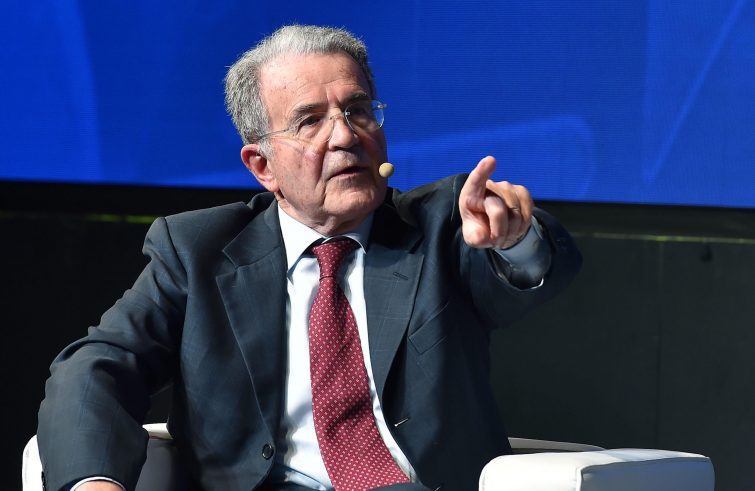
I had always thought that the Spanish flu had been the last pandemic. I was wrong; the impossible suddenly became possible. The epidemic rapidly spread from China and reached Europe, America and the entire world. All countries were affected and everyone was confronted with a situation that no one would have ever imagined.
During lockdown I realized that for the first time in my entire life I could not to attend Sunday Mass.
I have always been able to attend Mass, even during my travels abroad and in conditions that were sometimes unpredictable, and this was the first concrete sign of a change that was taking place. Since those first days in March, we all had to reckon with our ability to adapt. We discovered new ways of working and learned to make the most of what new technologies have to offer. Since I could not enter my parish church, which was just a short walk from home, I followed the Pope’s morning Mass. I learned to use various e-communication tools and in this way, in addition to the essays and books I had been planning to read for some time, I “met” secondary school and college students with remote lectures, I took part in many debates, interviews and in-depth analyses, exploiting the potential of the Internet.
For many families, isolation has meant being locked up in small homes, but for others it involved enduring the loneliness of an empty house. Many people saw a dramatic drop in their income, while for others those weeks caused distress, suffering and sorrow. The lockdown led to the suspension of school attendance for millions of students…
Nevertheless, so far we coped as best we could and, with the exception of a few isolated cases, the Italian people have complied with the rules.
Having overcome the first stage of the crisis, we are now faced with the repercussions of a long suspension of manufacturing and labour:
the coronavirus recession will be worse than 2008 and the worst since post-war years. We have limited resources and despite the efforts of the central government, along with economic stimulus measures offering all there is, we cannot make it alone. Nor can the wealthier Germany, the Netherlands, France or any other European country make it alone in the long term. It is only by acting in unison that we will be able to face a crisis that involves us all, while nobody bears direct responsibility for it.
 All European countries need more Europe, but the unexpected outbreak of the epidemic once again saw us struggling with long-standing, unresolved problems: disunity, loss of power on the part of the European Commission – the supranational institution – in favour of the Council – representing each single country -, northern Member States’ discord with southern European countries, the rigidity of the so-called virtuous (“frugal”) countries with respect to less rigorous countries in terms of government debt, the growing spread of sovereignist claims, the backwardness of the welfare state. All the above factors have slowed down and continue undermining appropriate European intervention.
All European countries need more Europe, but the unexpected outbreak of the epidemic once again saw us struggling with long-standing, unresolved problems: disunity, loss of power on the part of the European Commission – the supranational institution – in favour of the Council – representing each single country -, northern Member States’ discord with southern European countries, the rigidity of the so-called virtuous (“frugal”) countries with respect to less rigorous countries in terms of government debt, the growing spread of sovereignist claims, the backwardness of the welfare state. All the above factors have slowed down and continue undermining appropriate European intervention.
Faced with the unrelenting spread of the Covid-19 epidemic and the ensuing massive interventions by the United States and China,
we all realized just how much we miss Europe as a global player, defending the interests of the Union as a whole.
We experienced a visible absence of Europe, the greatest political innovation project of all time, involving solidarity and cooperation in the achievement of common goals.
This is something that should be given some thought: I certainly did not withhold criticism of Europe when its actions failed to live up to the principles and values underpinning them, but constructive criticism is not the same as being the enemies of Europe. Those political groups which, driven by a quest for national consensus, omit the fact that a divided Europe is doomed to disappear from the world map and mean nothing, that fail to recognize Europe’s withdrawal from the world stage as the collapse of a point of equilibrium between world powers involved in a long-standing struggle for supremacy, are Europe’s enemies. It means not contributing to safeguarding our model of liberal democracy in the face of the spread – from Asia to the Americas to the Middle East – of totalitarian governments. Defending Europe does not imply ignoring its limits. It means being aware that for the future of our young people, our economies, our welfare and even our way of life
we need Europe to revamp politics with courageous, long-term decisions.
Pope Francis has understood and expressed this with remarkable clarity. He reminds us of the centrality of our Union and the need for it to resume its role, both within Europe’s borders and with respect to the rest of the world. Indeed, his message reaches us at a time when Europe is facing a somewhat decisive challenge.
I say this with due caution: something seems to be changing in Brussels in a number of areas. First of all, the Franco-German axis appears to be back on track after a long interval coinciding with European inaction that led to virtually no form of EU politics and, among other things, to the strengthening of nationalist sovereignty in Europe which, in the absence of adequate support to the countries most affected by the 2008 crisis, and in the light of a near exclusive debt containment policy, gained electoral traction. The second aspect is that France, Spain and Italy have clearly succeeded not only in reaching an agreement extended to other countries, but above all they persuaded Germany to disassociate itself, for once, from the Nordic bloc that opposed all forms of assistance measures. The third is that the draft proposal (European Council of 17-20 July, €750 billion Recovery Plan, in addition to other measures to respond to the crisis previously approved by the EU – Ed.’s note) draws inspiration from the principle of solidarity underpinning the European Union.
This is the Europe that the European countries and Europe itself need to continue to function, and ultimately the whole world, as Pope Francis so aptly and incisively said. We cannot aspire to become a superpower, but we must strive to act as a counterbalancing force in the power struggle of the superpowers.
This process was disrupted in 2005 when France and Holland rejected the European Constitution.
That’s when Europe started to reverse its course, and since then we have been longing for the European project to resume, at least in the key areas.
We have a single currency, but we lack a harmonized fiscal policy. There is no EU army and no EU foreign policy. The pandemic has taught us that our welfare model, the greatest achievement of the past century, must not only be defended, in fact we also need to develop structures capable of responding to similar situations in Europe, whenever there is need for joint action with regard to public health, to ensure that everyone has equal access to treatment, medical supplies and protective devices.
I hope that this glimpse of change is but the first step towards a new Europe, closer to the Europe envisaged by the founding fathers at the end of the Second World War: faced with the ashes of that devastating conflict, they found the strength to join forces to permanently overcome a past of fierce wars and create a future of progress and prosperity for Europe.









